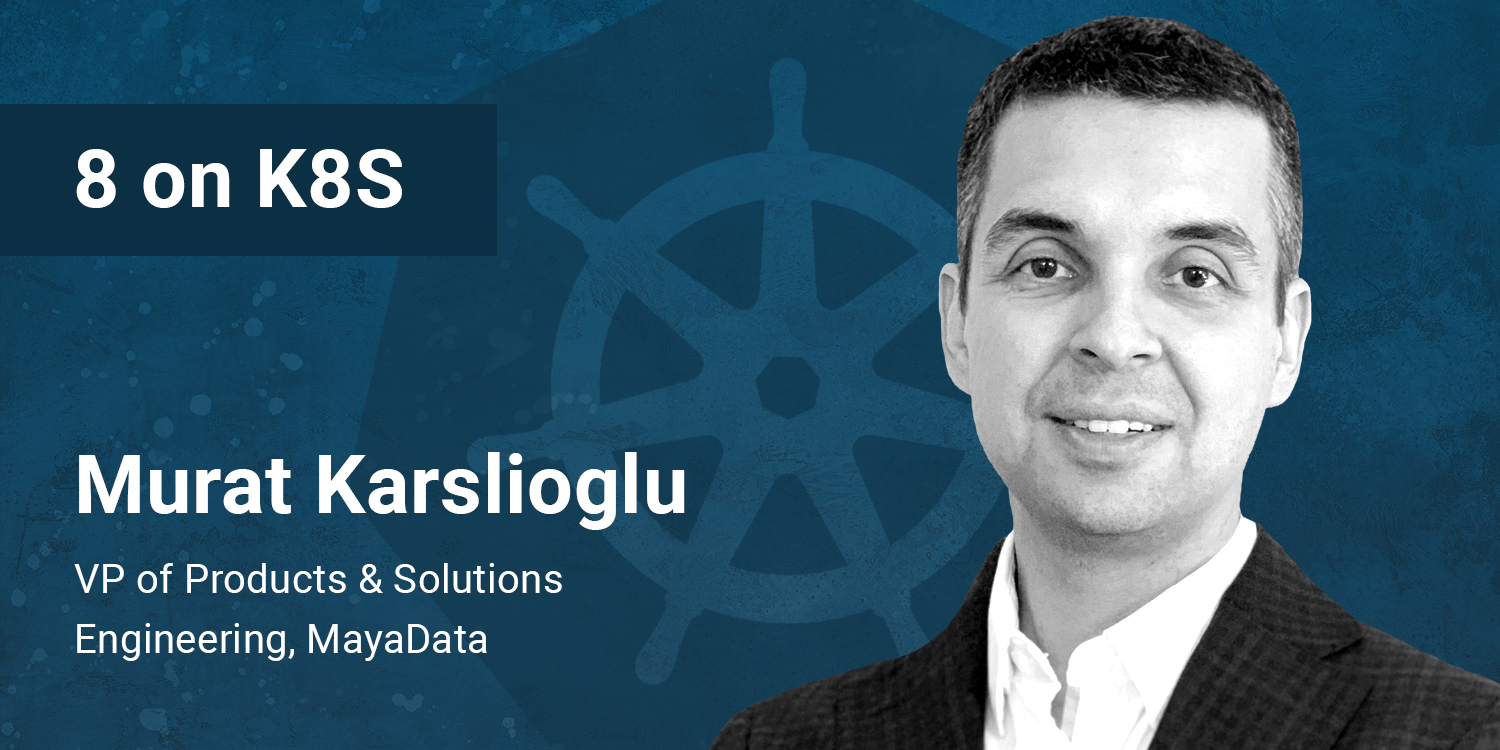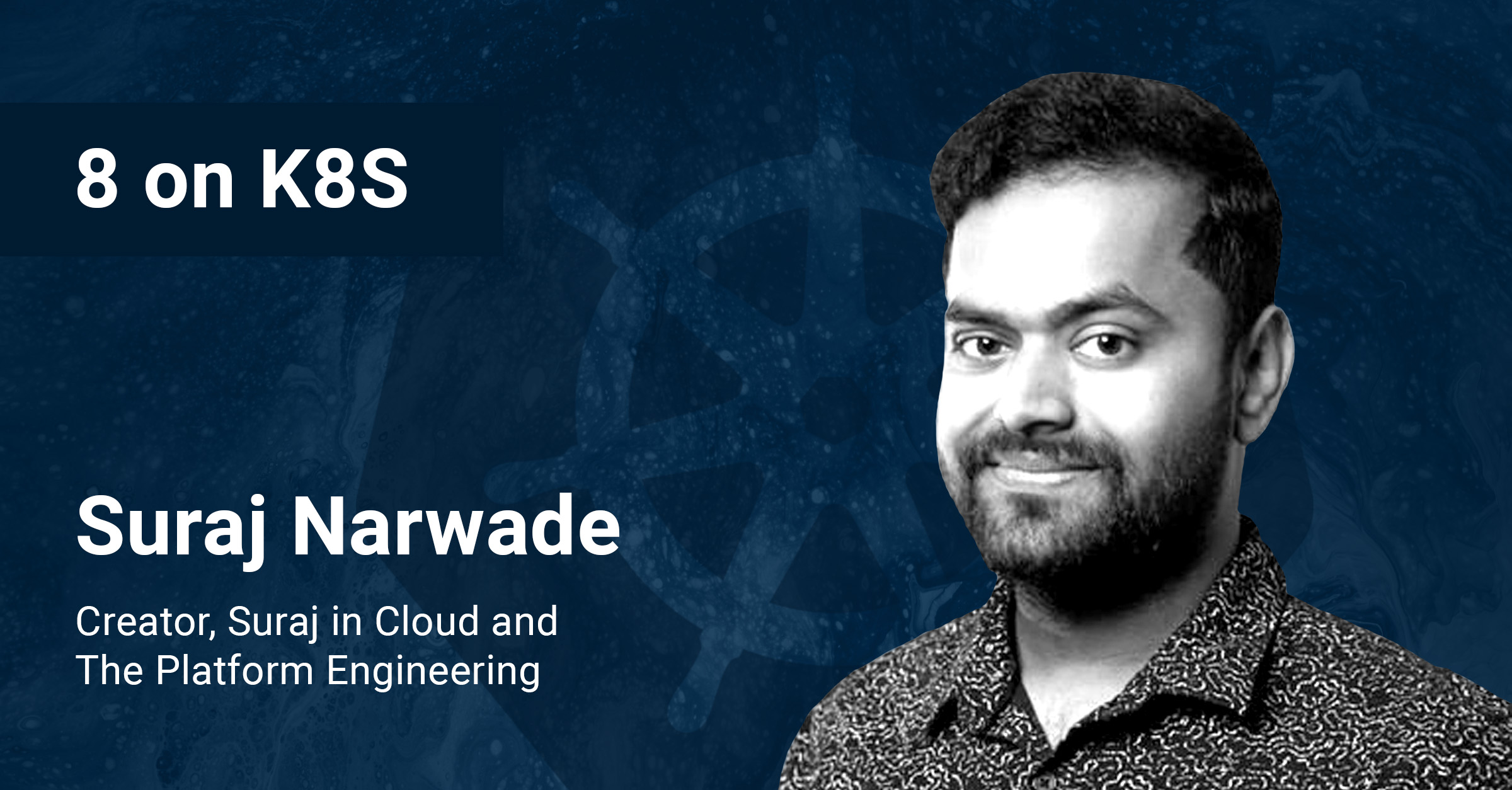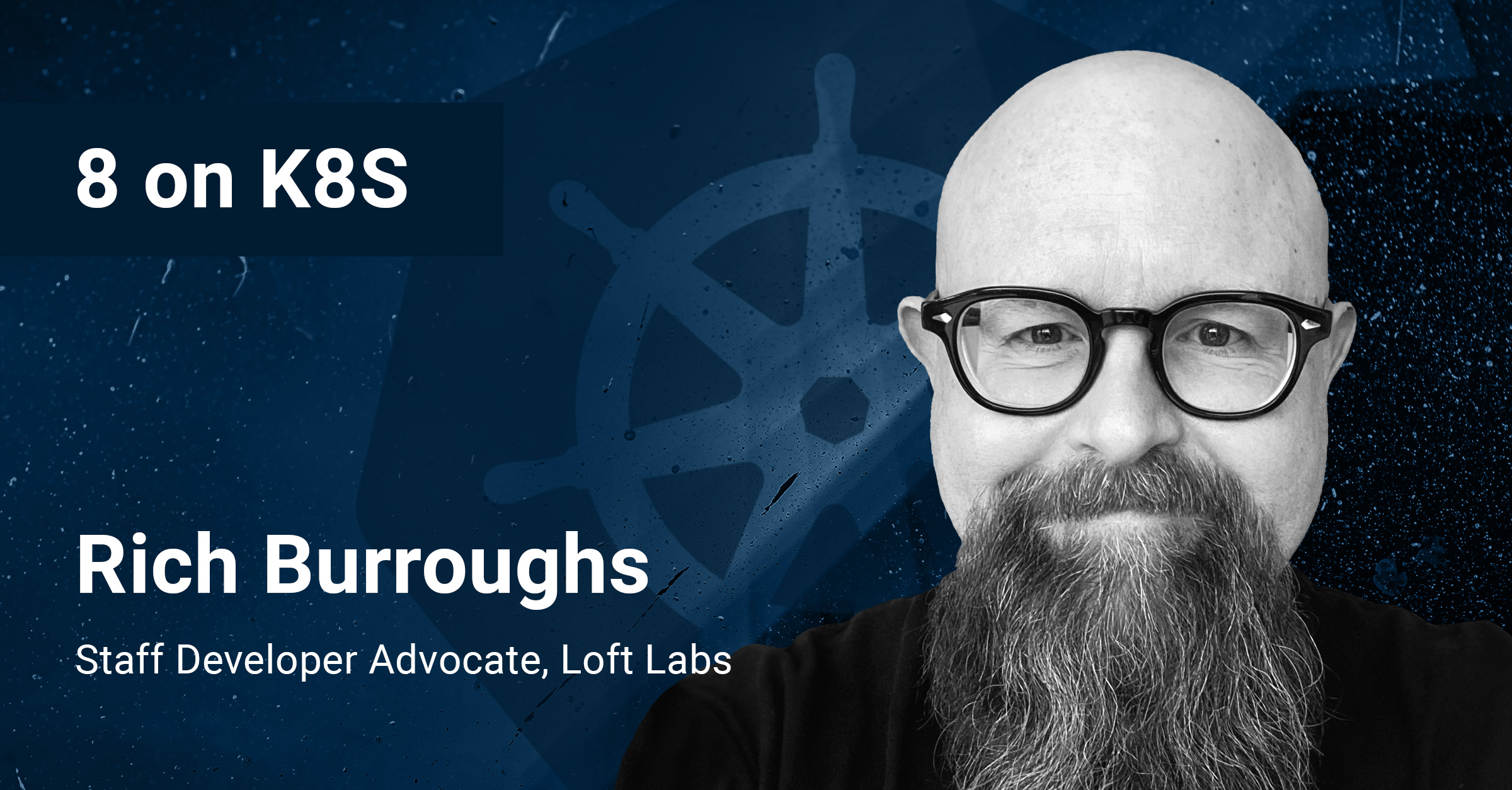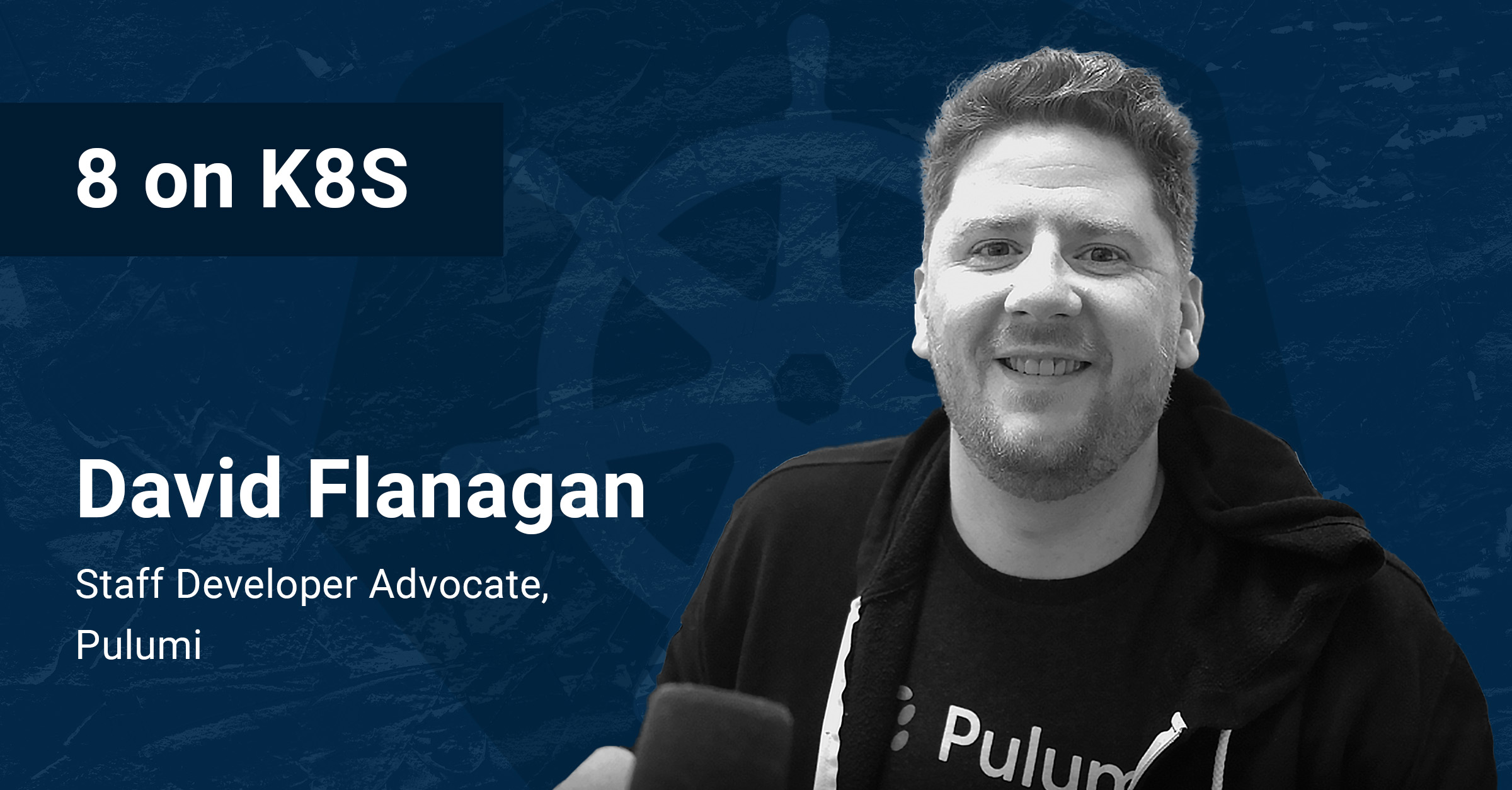8 on K8s with Murat Karslioglu
by The Team @ Giant Swarm on Nov 25, 2020

Welcome to our series 8 on K8s where we interview interesting people in the Kubernetes community. In fact, check out our previous one with Spotify Software Engineer Emma Bostian. If you’d like to be featured or know someone who’d be a great fit, tweet us and spread the love.
Murat leads the product management team at MayaData. He has recently published Kubernetes — A Complete DevOps Cookbook. Before joining MayaData, he was at Hewlett-Packard Enterprise Storage in various advanced development projects including storage file stack performance optimization and the storage management stack for HPE’s HCI solution. Murat holds a Bachelor’s Degree in Industrial Engineering from Turkey's Sakarya University, as well as a number of IT certifications. When he is not in his lab, he loves to travel, advise startups, and spend time with his family.
What’s the last book you read?
I'll have to tell you my life-changing story about reading first — I hope to encourage someone out there.
Every year, I refresh my vision board and list important goals for the year. In 2014, I listed twelve books that I wanted to read that year. It sounds easy, one book a month, and done! By mid-January, busy at my startup job, I got frustrated with my progress and decided to bring some change. I've started studying the magical art of speed reading.
Around that time, while looking for mentors, I met a not-so-famous (back then) Tai Lopez in Los Angeles. All these events have changed the way I look at reading. Since February 2014, I’ve been reading much faster, sometimes three to five books a week. Once you figure out speed reading, you want to read anything you can get a hold of. It's not as difficult as it sounds, and I wish I knew about it before my college years. If you’d like to learn more, this TedX talk from 2015 might be helpful. Many people who remotely know him from his YouTube ads think he is the “here in my garage” guy from 2015. He has successfully hacked the way of social marketing and became one of the top marketing gurus in the world today, which I naively want to believe is thanks to the magical art of speed reading.
Typically, I read a few books at a time, and I try to keep a well-balanced mix of business, self-improvement, history, biographies, and classics. I am addicted to history. The winners always rewrite history as we know it. If you want to learn about real history and get real answers, you need to dig in and read the originals, not translations, which is not always easy to do, not to mention the challenge of finding the sources to read. Otherwise, what you see on the bookstore shelves is an adopted story biased with the translator’s or publisher’s opinion.
Long story short, here is what I’m reading these days:
An Elegant Puzzle — Systems of Engineering Management by Will Larson.
It's not just a fantastic practical book on building and scaling engineering organizations. I'm absolutely amazed by the writer's and the publisher's (Stripe Publishing) approach to organizing the content and including QR codes for the references at the end of the book. I have added many useful articles and books from the author's list to my reading list. Very useful, highly recommended for every startup and people managers at high-growth companies.
Automating Inequality: How High-Tech Tools Profile, Police, and Punish the Poor by Prof. Virginia Eubanks.
Recently I took the Machine Learning course on Coursera; I am interested in neural networks and the impact of automated decision-making. This book talks about the effects of automated decision-making on public services in America. A profoundly unsettling exploration, and the reason I believe that somebody should not automate decision making based on ML alone before looking into what goes into the decisions. In this regard, I trust companies based in the European Union more than the rest of the world, including the USA.
The Soul of a Butterfly: Reflections on Life's Journey by Muhammad Ali.
It is old, but gold. I haven’t read it before and recently received an autographed copy from a good friend. It feels good to touch a book once held by the legendary Muhammad Ali. It's an inspirational book that comforts me during these troubled times. As comforting as reading Rumi poems.
“Success is not achieved by winning all the time. Real success comes when we rise after we fall. I am grateful for all my victories, but I am especially grateful for my losses because they only made me work harder” — tells a lot about where we are now.
What Strange Mystery Unites the Turkish Nations, India, Catholicism, and Mexico?: A Concise but Detailed History of Things Divine and Earthly by Gene Matlock.
My interest in the history and etymology of words brought me to this book. A topic of a whole different conversation and an interesting one that includes the origins of 'Kubernetes' as well, yes, our Kubernetes. 😀 While on a trip to Chichen Itza, visiting the Temple of Kukulkan and other sites of Mayan civilization, I was amazed to hear many words that I'm familiar with from my ancient native language, Turkic. I will not spoil the story, but it is not something I’d suggest reading if you haven’t read Zecharia Sitchin’s famous The Earth Chronicles.
If you aren't ready to go down the rabbit hole, don’t read it, I’m serious. 😀 Your view of the world will not be the same after finishing this nine-book series.
While it’s almost the end of the week, as we speak, my soon-to-read list includes Inspired: How to Create Tech Products Customers Love by Marty, The Barcelona Way: How to Create a Winning Team by Prof. Damian Hughes, Breaking the Maya Code by Michael D. Coe, Good Strategy Bad Strategy: The Difference and Why It Matters by Richard P. Rumelt, and The Art of Doing Science and Engineering: Learning to Learn by Richard W. Hamming. Yes, I've ordered all the Stripe Press books and they're all worth reading.
What problem are you trying to solve?
This is a more straightforward question I ask myself every day. I'm passionate about developer and SRE problems, immensely improving developer velocity (enabling small teams to do things faster, autonomous execution), and mainly that comes down to having domain expertise and being interested in infrastructure problems. Intelligent infrastructure is something that I'm trying to build at the last three companies I've worked for. Domain expertise is the bottleneck, causing production delays. Combining my expertise in infrastructure, I'd like to solve the Data Agility problem.
We traditionally look at three metrics when measuring infrastructure performance: latency, bandwidth, and sometimes IOPS if storage is involved. With the new trends, including DevOps culture, NVMe protocol, increasing CPU core numbers, Edge, IoT, ARM processors, and demand in microservices, the fourth metric we need to consider is the agility, infrastructure delivery lead time.
At MayaData, we initially started with the OpenEBS project by simplifying and accelerating storage control and data plane using Kubernetes and delivering real cloud-native storage solutions for CI/CD, ML, and other use cases where stateful workloads are required. Also, moving the detection of failure to the early phases of development (in the CI/CD pipelines where it is cheapest to detect), we have developed and donated the Litmus Chaos project to the CNCF. The final part of the solution is the Kubera (By the way, the Sanskrit Kubera is very likely the origin of the Greek word Kubernetes. Check the source). We have recently launched two new Kubera products. Kubera Propel extends Kubernetes for high-performance data, and Kubera Chaos adds resilience, compliance, and ease of use to manage through the lifecycle of your data-intensive cloud-native workloads on Kubernetes today. Our product portfolio and vision is to improve developer velocity by enabling agile cloud-native data and shifting left with chaos engineering built into your workflow.
What’s an interesting trend you’ve observed in our industry?
At a very high-level we are in a big API layer war. Virtualization put a layer on hardware and turned it into a commodity. Cloud API layer turned virtualization into a commodity.
Kubernetes should turn the cloud into a community. But I don’t think that would make cloud vendors and hypervisor companies very happy, right?
Kubernetes is supposed to unify the management experience of the public/private cloud and bare-metal on-prem deployments. And I believe we will see the return of VM in the form of MicroVMs after this. Other trends I’m excited about our data layer moving towards NVMe protocol replacing the 30-year-old SCSI stack. The impact of modern programming language focused on memory safety and performance like Rust. And an increasing use case of ARMv64-based clusters and its implications on Edge and IoT. Edge was always the next-year thing; we seem to be closer than before.
What’s the last thing you read about our industry that got you really fired up?
SNIA’s Storage Developers Conference (SDC20) this year was amazing. Improvements in the area of computational storage and NVMe 2.0 specs. NVMe is the fastest-growing storage technology of the last decade. I was also really excited about the new AMD Zen 3 architecture and ARM getting acquired by NVIDIA.
What do you do that helps you maintain balance in your life?
Reading, creating small wins, timeboxing work, and personal time — my kids and family activities.
What’s the biggest risk you’ve ever taken?
I take mostly calculated risks, but let’s be honest, I've failed a lot too.
Founding my first startup, my first large angel investment, living with a tribe in Kenya, but when I look back, migrating to the US where I have no network was the biggest risk I’ve ever taken. Leaving a successful career, friends, and connections I have invested in for many years is a true restart in life. If you are an ambitious person like me, immediately putting yourself out there as a second or third-class citizen and dealing with immigrant life challenges, such as racial discrimination, are not to be underestimated.
Thanks for the opportunity to speak. Surprisingly I don't get questions like this a lot, but hidden discrimination is a real issue in the US, even worse now than before. More people like to see me as Mike Cohen rather than Murat Karslioglu. A real story; at the beginning of my US journey, my friends suggested that I change my name. I didn’t understand but tested it anyway. Sending the same resume under an American name instead of Murat seriously got me more interviews. Until you build your brand, people have a prejudice against immigrants. It just becomes less visible and less obvious over time, but it doesn’t go away even after being in business for many years.
That’s the reason many like myself start their own companies, because, especially at the higher levels, we don’t fit into the image the entitled types have in their mind. I've heard this feedback from others as well.
People I work with know me as a great communicator. I like to attack difficult problems and my greatest weapon has always been communication. It's funny, seeing people who never left their city apartment, barely speak one language assume by looking at our names that we can’t be in a critical communicator role. They have a place in their minds for every race and type. These companies don’t survive long, but it is still a real problem in our industry.
Who do you look up to in the industry?
Educators, mentors, and analysts. I'm a true fan of Andrew Ng, Jess Hamrick, Lawrence Hecht, Nora Denzel, Mark Russinovich, and Mitchell Hashimoto.
Can you hold two contradictory thoughts in your mind simultaneously without feeling uncomfortable?
Just two. 😀 Over time, I understood that the truth is a multi-layered reality, just like a giant onion. And maybe smells like one. Facts are no more than our perception of reality. It's up to you to decide to peel it. When you peel and look under, it is going to stink. When you are holding a thought, you should always push the possibility of being wrong, and most of the time, you/we are. If you are not doing it, you can’t learn. Everything we know about our reality, including science and physics and the universe, will perhaps one day be proved to be wrong.
We are travelers; if you see everything the same tomorrow, that means you haven’t moved at all.
You May Also Like
These Related Stories

8 on K8s with Suraj Narwade
Welcome to our series 8 on K8s where we interview interesting people in the Kubernetes community. In fact, check out our previous one with Rich Burrou …

8 on K8s with Rich Burroughs
Welcome to our series 8 on K8s where we interview interesting people in the Kubernetes community. In fact, check out our previous one with Álvaro Agea …

8 on K8s with David Flanagan
Welcome to our series 8 on K8s where we interview interesting people in the Kubernetes community. In fact, check out our previous one with Murat Karsl …